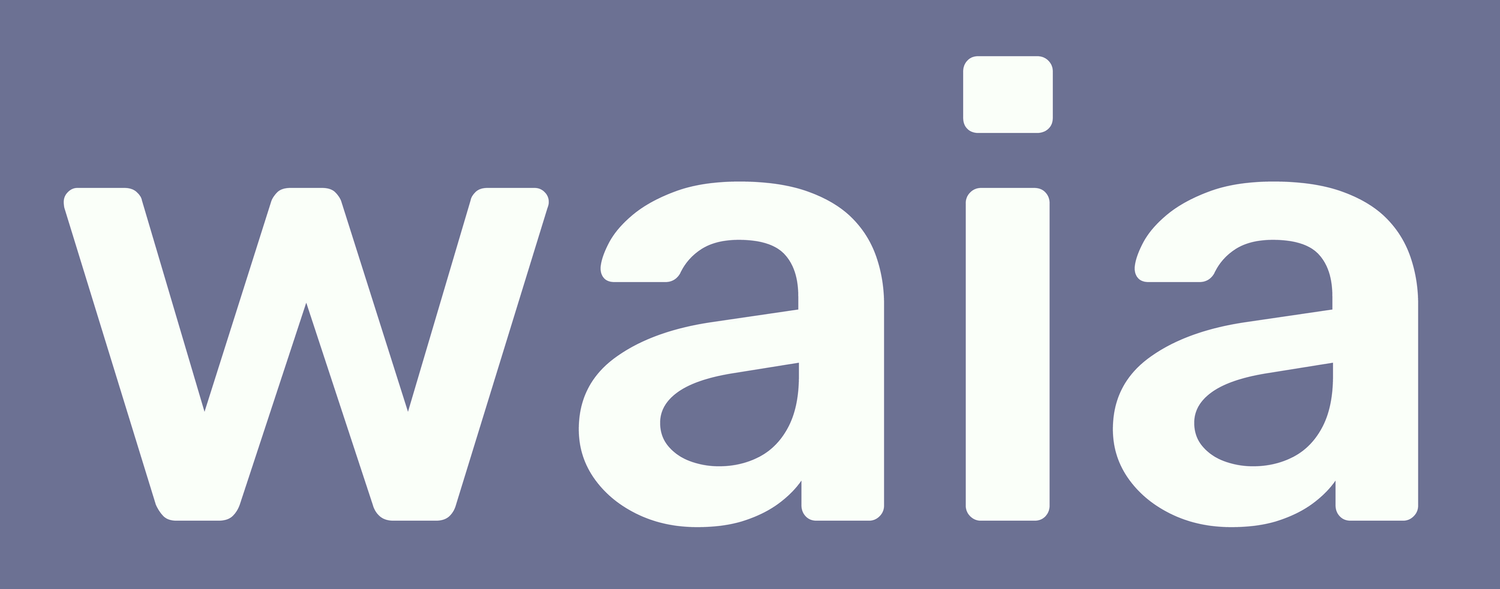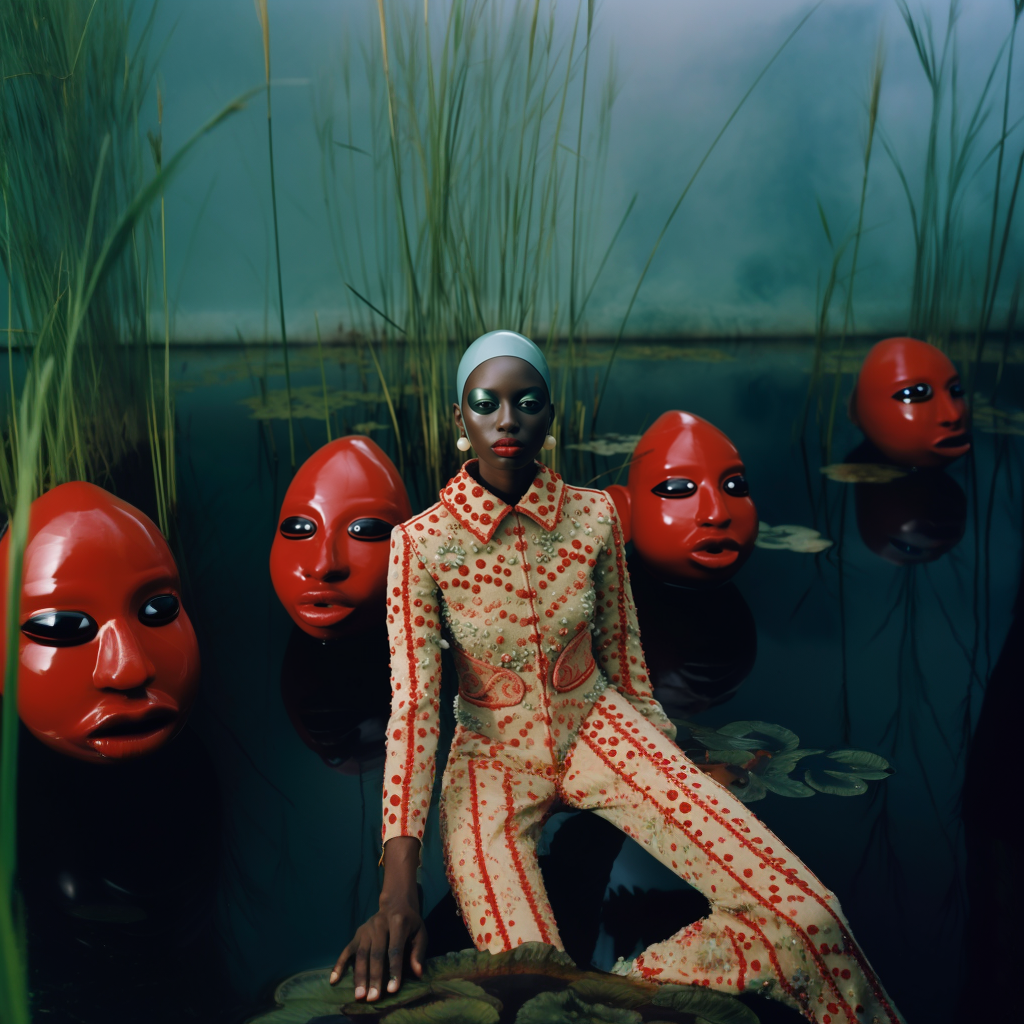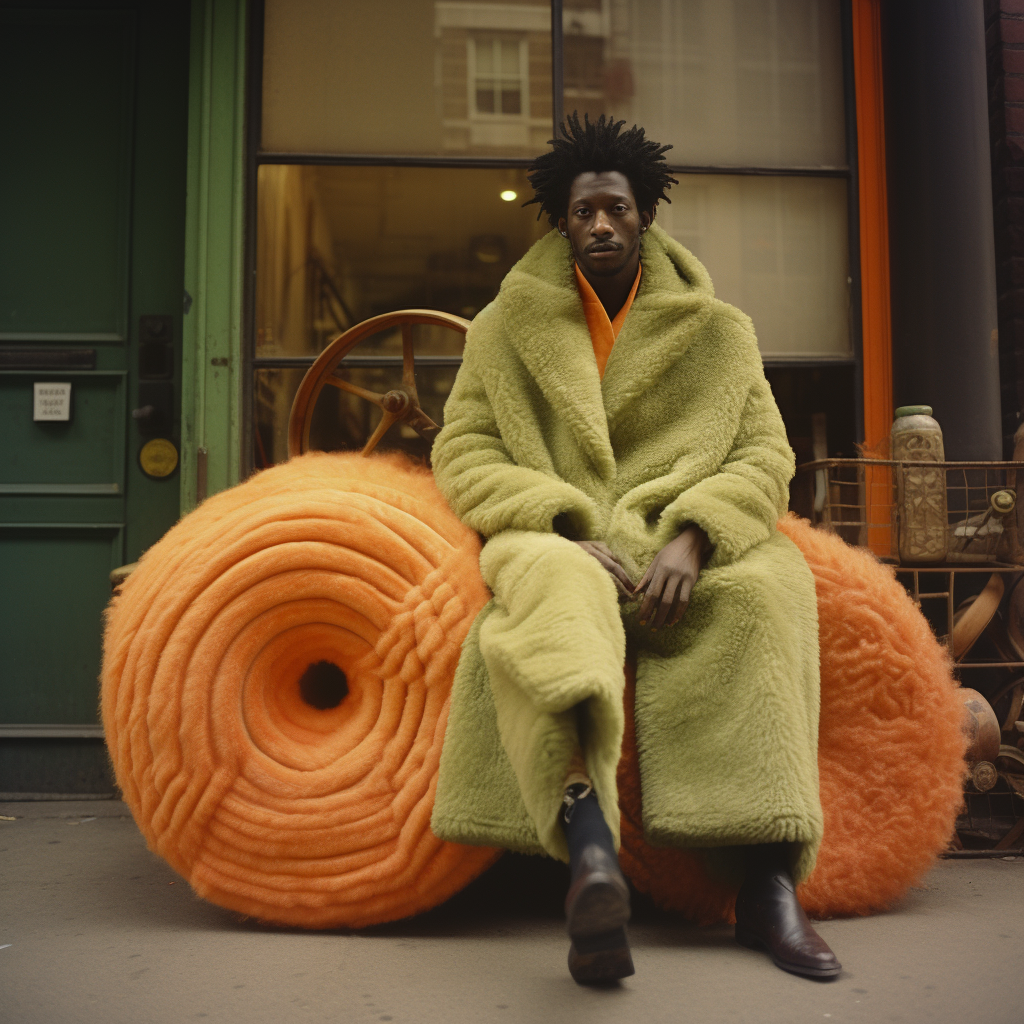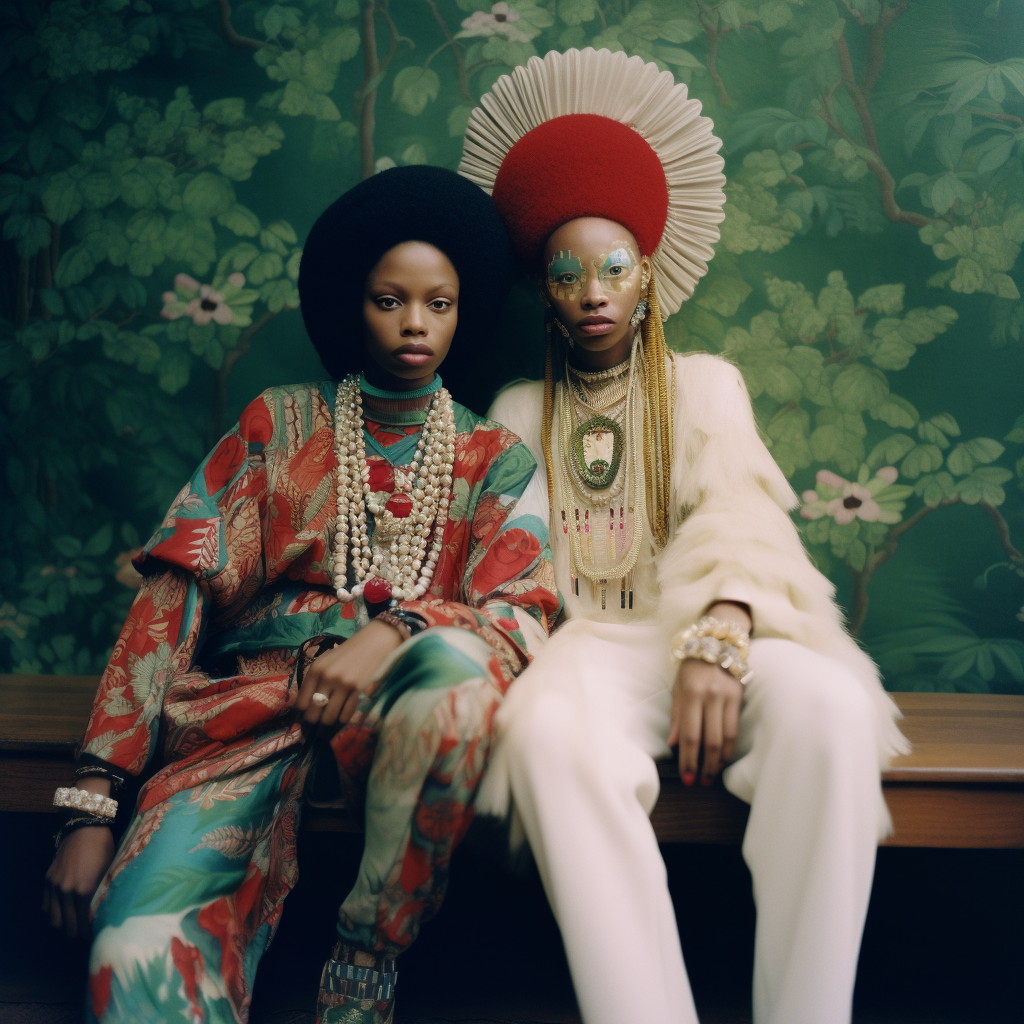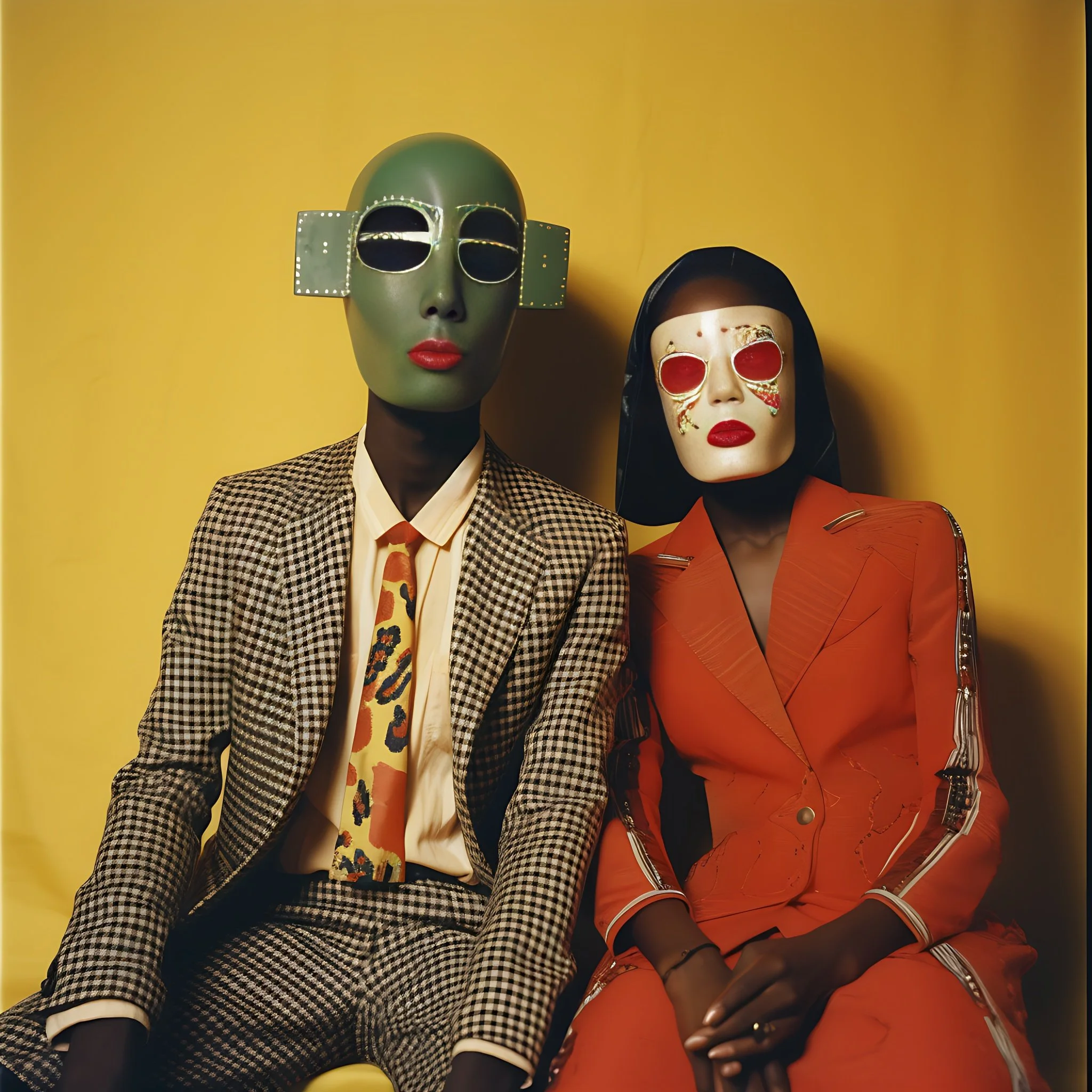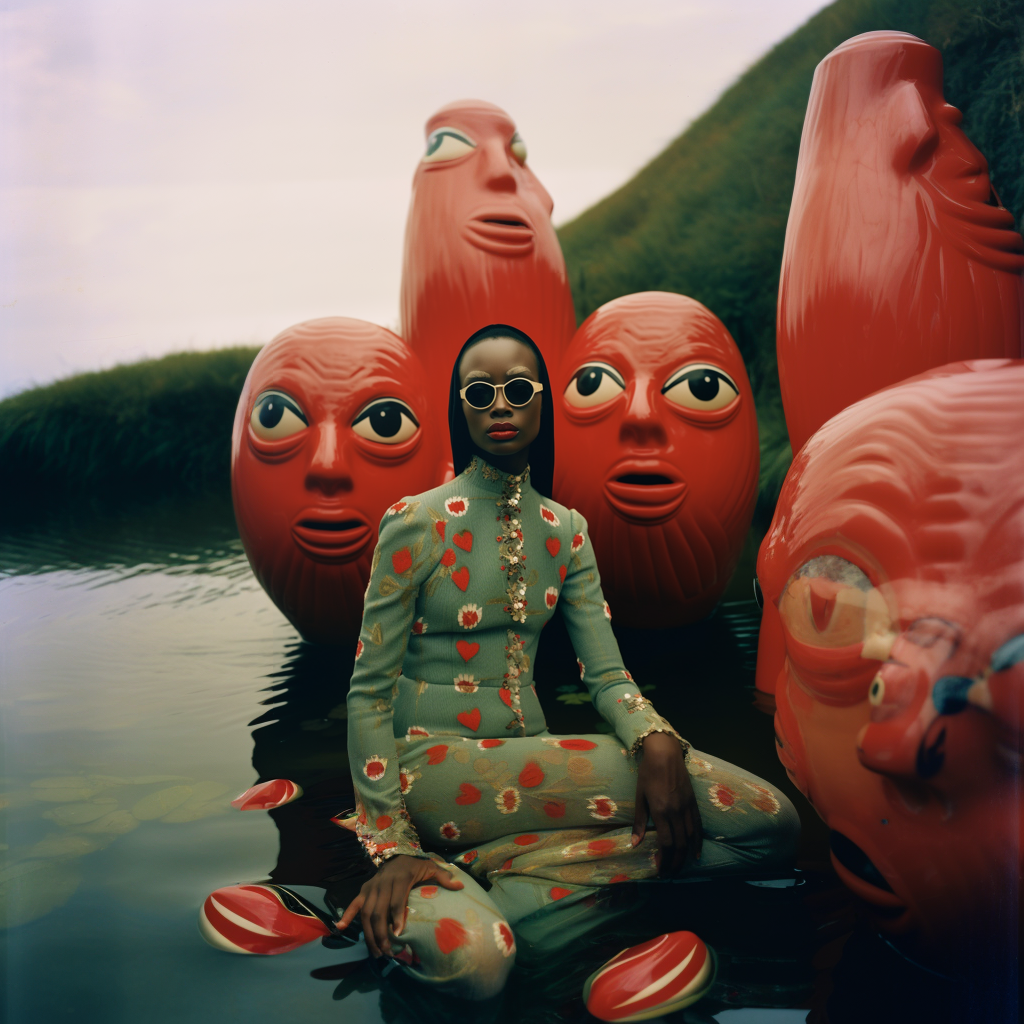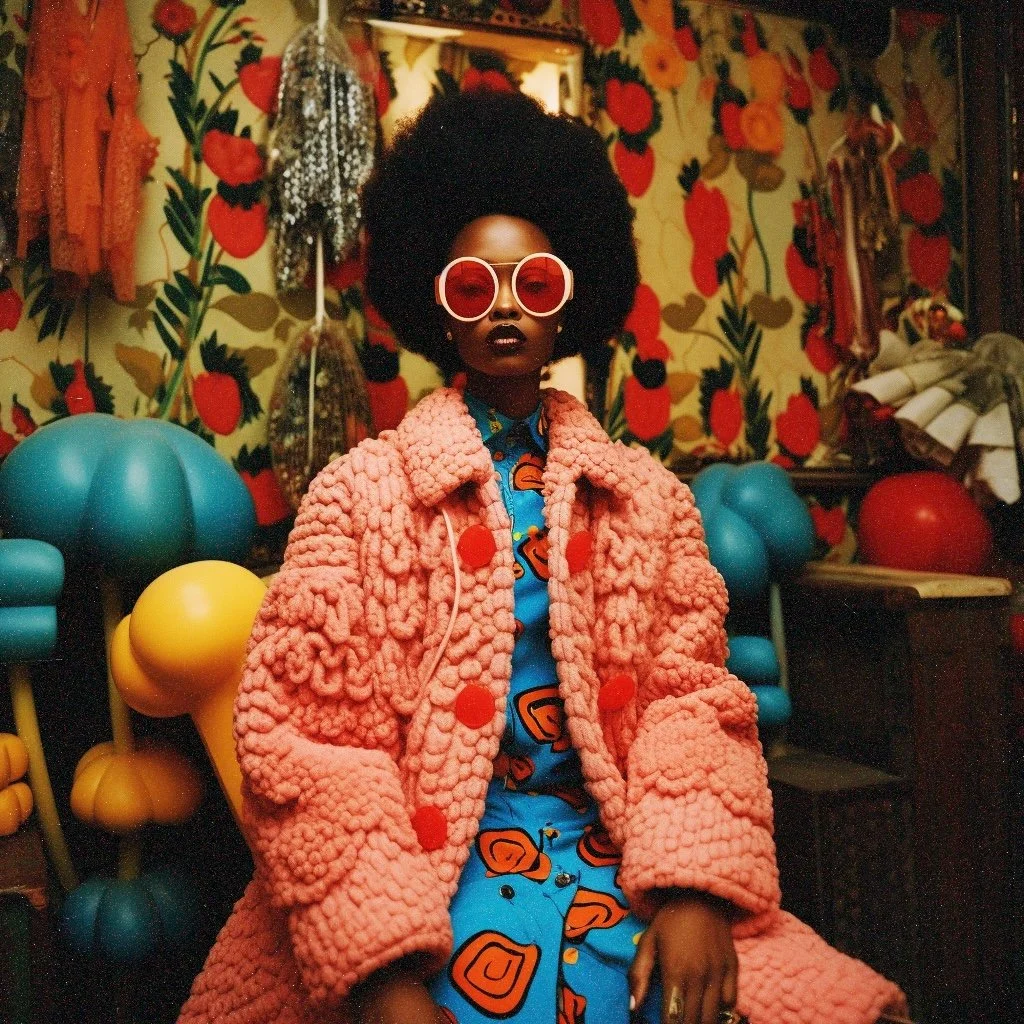Meet Joy!
Introducing Joy (IG: @joyfennell), a New York-based artist and the creative force behind the design studio Future in Black. With a 20-year legacy in makeup artistry, predominantly in NYC’s fashion scene, Joy has transitioned into the realm of AI art, finding in it a new canvas for expression. Her work is a testament to her mastery of color and her ability to craft captivating environments and outfits, creating a visual feast that is as intriguing as it is expressive. Drawing inspiration from her roots in Harlem and the South, as well as her passion for Afrofuturism and black representation, her work is a vibrant fusion of past, present, and future. In this spotlight interview, Joy shares her journey from makeup to AI, highlighting her dedication to inclusivity and the power of technology in amplifying diverse creative voices.
Can you tell us a little bit about yourself and how you got interested in AI art?
For about 20 years, I wore the hat of a makeup artist, and a good chunk of that - 17 years to be exact - was in the hustle and bustle of NYC, working the fashion editorial scene. I’ve always had a thing for art. I actually won an award back in elementary school for a piece I made. But honestly? My love for art kind of took a backseat for a while. It wasn't until college (because I was tired of writing and reading in college) that I thought, “Why not makeup?” And swapping my canvas for faces? Best decision ever.
Fast forward to today, and I've retired my brushes. My health made it tough to keep up with the demanding makeup world. While figuring out my next move, a fun day with a friend’s VR headset had me hooked. I thought, "Tech might just be my next big thing!" I'd heard about AI, and yeah, it scared me a bit. And as much as I want to dive into AR, it's been a bit tricky. My first attempts with AI weren't super smooth, but after some time, I started to see its magic. It hit me that this could be the tool that gives a voice and platform, especially to black creatives like myself.
Who or what are your artistic inspirations, and how do they influence your work?
Honestly, I find myself inspired by the world around me every single day.
Beyond that, my roots and the vibrant narratives of Harlem and the South have always been a profound influence. The rich history, the pulsating street culture, and the stories of resilience — they all feed into my art, making it a fusion of past, present, and future.
And speaking of the future, my love for Afrofuturism along with surrealism and the desire to see more representation, especially for the black community, drive a lot of what I do. I mean, why should the standards of beauty be so monochromatic, right? We need more shades, more voices, more stories.
In essence, dreams of a more inclusive future, my inspirations are as varied as they are vibrant. They challenge me, fuel me, and most importantly, remind me to keep things playful and genuine.
How do you approach the creative process when working with AI?
With AI, the boundaries are constantly shifting and expanding. It's like having a huge playground where the only limits are the ones I might impose on myself.
As for techniques and tools, it varies. Given the dynamic nature of AI, I'm not tethered to one specific tool. Instead, I flit between various platforms, choosing the one that best aligns with the whimsy or curiosity of the moment. The magic lies in that unpredictability, in letting the AI take my initial spark – be it from that flower I saw or a scene from a Wes Anderson film – and morph it into something unexpected.
When it comes to traditional art, there's a tactile and raw connection between the artist and the medium. With AI, it's a digital dance of sorts. Instead of my hands directly shaping the art, it's my ideas and the AI's interpretations blending together.
The most crucial takeaway for me, and something I want to echo especially for my community, is the liberation AI brings. It offers us a chance to step out of the historical boxes we've been placed in and create from, and craft narratives that are untethered from the past, whimsical, and forward-looking. It's about reclaiming our right to simply create, to dream, and to do it with joy. Unapologetically.
Can you share a specific moment that transformed your perspective on AI art?
Absolutely! One piece that immediately comes to mind is my "Wes Anderson Beauty" line. This project was a lot of fun to create! I dove headfirst into creating a fictional beauty line, drawing inspiration from Wes Anderson's distinct aesthetic. What began as a curious exploration quickly became an obsession. The more I played with the AI tools and visuals, the more I felt an urge to expand the narrative.
What truly transformed this project for me was the deliberate inclusion of black individuals. I felt a pressing need to challenge and redefine the traditional standards of beauty that often overlook the beauty of black people. Through this AI art series, I aimed to both celebrate the whimsy of Wes Anderson's style and amplify the beauty and grace of black individuals, melding them into a narrative that is both playful and profound.
It wasn't just an artistic endeavor for me; it was a statement. That project genuinely reshaped my perspective on what AI art can achieve in terms of challenging norms and crafting inclusive narratives.
How do you balance your work in AI art with other professional or personal pursuits?
Juggling the roles of an AI artist, along with other responsibilities, is honestly a challenging wild ride. There are nights when inspiration hits, and I find myself working on a project until 4 a.m. There's a certain exhilaration in that moment – a mix of passion, frustration, and pure adrenaline. And yes, while it's thrilling, it also comes with its fair share of "Oh no, why did I stay up so late?" moments the next morning but I love it! The highs, the lows, the in-betweens – they make me feel alive.
To ensure that this passionate pursuit doesn't get in the way of my other responsibilities, I've put a few practices in place. Firstly, I've learned to listen to my body. If I've had a late night, I'll adjust my next day's schedule, maybe sneak in a power nap or start a little later. Secondly, I try to compartmentalize my time. When I'm working on art, I'm all in, but when it's time for other duties – be it a job task or family time – I fully commit to that.
How has working with AI in art influenced your mental and emotional wellbeing?
I think it's had a very positive effect on my mental. I've always felt that art can be therapeutic and now I definitely know it's true. My mother passed away recently and I would say that working on certain work totally saved me. I was able to channel that hurt and pain into creating something that was tangible and represented my grief. It gave me a much-needed positive outlet.
In your opinion, how does AI redefine the concept of creativity and artistic agency, and how do you see it impacting the future of art?
AI, for me, acts as an extension of the artist's canvas, opening up avenues of creativity that were previously uncharted or even unthinkable. Its introduction to the art world reshapes the very essence of what it means to create.
In my work, AI hasn't acted as a replacement for human creativity, but rather as a collaborator. It provides a unique blend of precision and unpredictability, challenging my artistic sensibilities and pushing me to explore outside of my boundaries. This dance between my vision and AI's interpretations has led to results that are both surprising and resonant deeply within my heart.
AI's role in the broader artistic landscape, I believe, is about democratization and expansion. It breaks down barriers, making art more accessible and allowing for a fusion of past, present, and future. For historically marginalized communities, like the Black community which I'm deeply connected to, AI offers an opportunity to break free from historical boxes and create narratives that are forward-looking and unbound by past constraints.
As for my place within this evolving landscape, it's hard to say. I envision myself in two ways like a pioneer in merging cultural narratives, like those of Harlem, with futuristic AI-driven aesthetics, and a student, ever-curious, always learning from the vast potential AI offers.
So in essence, I truly believe that AI doesn't diminish the artist's role; it amplifies it. It urges us to question, to experiment, and to dream bigger, redefining not just art, but also our understanding of creativity.
What role do you think AI art can play in highlighting social issues?
AI art offers unique avenues to spotlight a lot of social issues. However, my approach is different. Rather than confronting social issues head-on in my AI art, I immerse myself in the act of creation. For me, just doing the work, existing and creating in this space, is revolutionary in itself especially for my people to see.
I've observed that a lot of people are locked in a state of fear, and apprehensive about diving into the world of AI art, especially when it comes to representing cultural and social nuances. But there's power in breaking through that barrier, in simply taking the plunge.
In essence, while AI art provides a vast canvas to address social issues, my personal journey is about subtlety, resilience, and the quiet yet profound statement made by merely engaging with the medium and crafting narratives that resonate.
If you could collaborate with any artist, living or not, who would it be and why?
It's hard for me to say one person because so many people inspire me on a constant basis but here are a few people: Kanye West, Es Devlin, Arthur Jafa, Sonya Clarke, Gordon Parks, Virgil Abloh, and Thelma Golden. This is a really short list but honestly, I'm constantly inspired by the world. As far as the people that I've named go, their art has made me feel an emotion that I've never felt before. Their work has either brought me to tears or made me really sit and contemplate life.
What advice or encouragement would you give to aspiring women who are interested in pursuing AI art?
So there are a few things that I would say, first your voice is needed. So make sure you dive into this world knowing your unique perspective as a woman is pure gold. Second, It's essential to connect with other women navigating AI art; sharing experiences can amplify the fun and growth. Also, make sure you celebrate every achievement, no matter how big or small. Finally, always remember to shake things up – challenge norms, be audacious, and let your creations speak for themselves. Dive in head first, be fearless, and let your vibrant energy set the AI art scene ablaze! Don't listen to the naysayers or fear-led people. Do you boo!
For more of Joy’s incredible work, make sure to visit her Instagram account: @joyfennell
